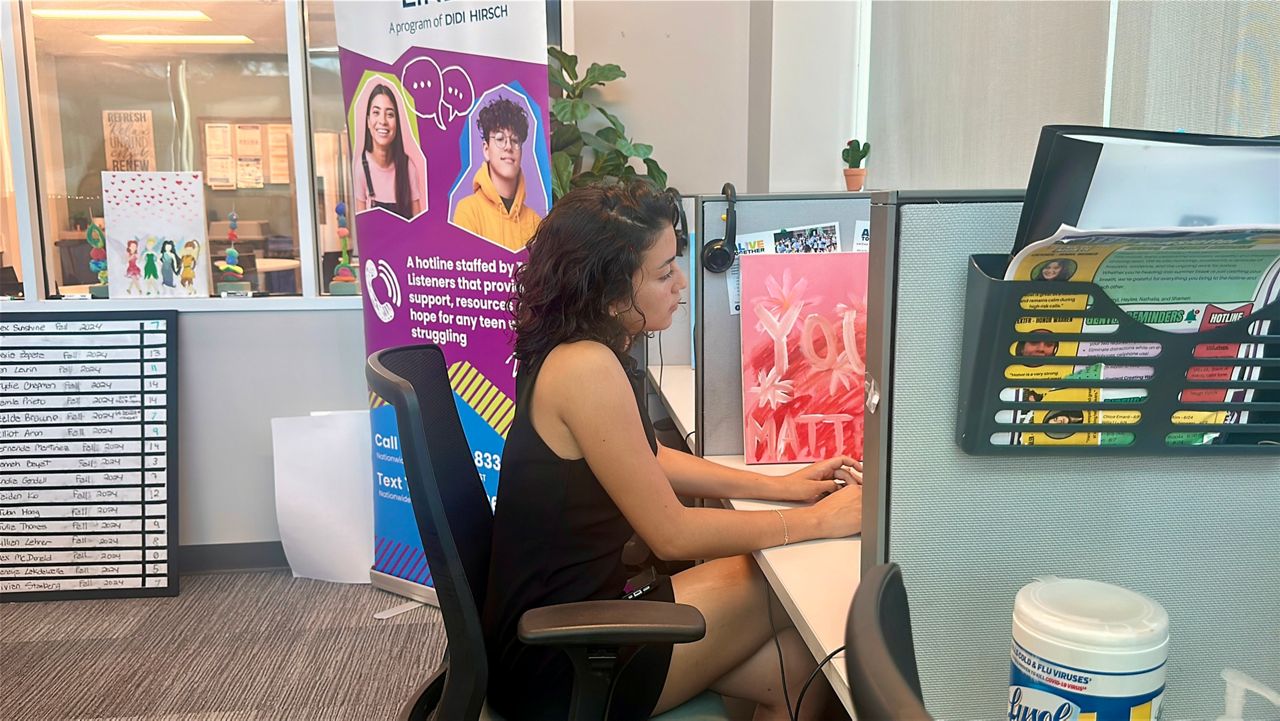LOS ANGELES — When a teen is struggling, sometimes the person who can help most is another teen who’s been there.
What You Need To Know
- Teen Line, part of the Didi Hirsch Mental Health Services, trains teens to respond to other teens struggling with mental health
- About 20% of those ages 12 through 17 said they have unmet mental health care needs, according to the CDC
- Teen Line says that more than 50% of teens report that family, friend and romantic relationships are the main reason they reach out
- Teen Line is available by calling 800-852-8336 or texting teen to 839863
That is the idea behind Teen Line, a program that is part of the Didi Hirsch Mental Health Services, training young people to be the first line of support for their peers in crisis.
The selected teens spend 65 hours training in a group setting with their peers, learning about active listening, empathy, as well as topic specifics like suicide, child abuse, LGBTQ, and much more.
After their training, the teens answer emails, texts and finally calls from other teens calling in for help.
One teen responding is Ela Orengo, a high school senior who has been volunteering with Teen Line since her freshman year.
“It’s a huge responsibility, someone like team line trusting me and confiding in me to do the best that I can and essentially, like have to do the best so that I can save someone,” said Orengo.
Although she says there is no way to know how many lives have been saved, it brings her peace knowing she is part of helping someone’s day get better. She remembers a call where the teen shared they were feeling suicidal.
“By the end of the call, I do remember she was giggling, and we were talking and I gave her more resources and I asked her how she felt. And when she said she felt better, I was so happy and like it filled me up knowing that I can help someone,” said Orengo.
That is the idea, said senior program director Cheryl Eskin, pointing out teens just feel more comfortable opening up to other teens.
“They just have a way. They understand each other’s language. They understand cultural references, music, text, expressions, things of that sort,” said Eskin.
Eskin said that although their services have been around for 40 years now, they have seen an increase throughout the years in the number of callers and are again on track to support 10,000 young people this year.
She said that over 50% of teens report that family, friend and romantic relationships are the main reason they reach out.
“We are seeing an increase in relationship contacts, loneliness. Teens are more connected than ever, but they’re also more disconnected in the same way,” said Eskin.
In 2023, the CDC found:
-
4 in 10 (40%) students had persistent feelings of sadness or hopelessness.
-
2 in 10 (20%) students seriously considered attempting suicide and
-
Nearly 1 in 10 (9%) attempted suicide
These statistics are across the nation, but Eskin says they have people from all over the world reaching out with similar feelings.
“We’re hearing from teens internationally — Tanzania, the U.K., Japan, China. What we’re really finding is that teen angst is teen angst. Different cultural, geographical norm, but there are some things that do hold true and so we’re able to be a resource for teens in other areas who might not have that type of support,” said Eskin.
She said they have noticed callers are also getting younger.
“So we are hearing from teens 11, 12, 13. Some of it may be that the access to phones is starting earlier, but I also think mental health concerns may be starting earlier as well. So again, for parents to be aware, it’s not too young for your ten-year-old to be struggling, and it’s something to be aware of,” said Eskin.
She said parents can look out for behavioral, attitude, or personality changes. For example, an outgoing teen that has withdrawn or no longer cares about school.
Orengo said friends can also help by just listening to their peers.
“I think starting off with, like, what you can do to help with if you can apply to Teen Line, or if you can join a mental health club, I think that’s the most important thing that anyone can do,” said Orengo.
Teen Line is available by calling 800-852-8336 or texting teen to 839863.
